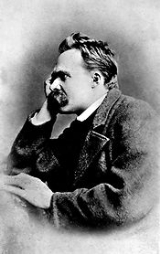Friedrich Wilhelm Nietzsche (ˈfʁiːdʁɪç ˈvɪlhɛlm ˈniːtʃə; in English ˈniːtʃə) (October 15, 1844 – August 25, 1900) was a 19th-century
GermanThe Germans are a Germanic ethnic group native to Central Europe. The English term Germans has referred to the German-speaking population of the Holy Roman Empire since the Late Middle Ages....
philosopherPhilosophy is the study of general and fundamental problems, such as those connected with existence, knowledge, values, reason, mind, and language. Philosophy is distinguished from other ways of addressing such problems by its critical, generally systematic approach and its reliance on rational...
,
poetPoetry is a form of literary art in which language is used for its aesthetic and evocative qualities in addition to, or in lieu of, its apparent meaning...
,
composerA composer is a person who creates music, either by musical notation or oral tradition, for interpretation and performance, or through direct manipulation of sonic material through electronic media...
and
classical philologistClassical philology is the study of ancient Greek and classical Latin. Classical philology has been defined as "the careful study of the literary and philosophical texts of the ancient Greek and Roman worlds." Greek and Latin literature and civilization have traditionally been considered...
. He wrote
criticA critic is anyone who expresses a value judgement. Informally, criticism is a common aspect of all human expression and need not necessarily imply skilled or accurate expressions of judgement. Critical judgements, good or bad, may be positive , negative , or balanced...
al texts on religion, morality, contemporary culture, philosophy and science, displaying a fondness for
metaphorA metaphor is a literary figure of speech that uses an image, story or tangible thing to represent a less tangible thing or some intangible quality or idea; e.g., "Her eyes were glistening jewels." Metaphor may also be used for any rhetorical figures of speech that achieve their effects via...
,
ironyIrony is a rhetorical device, literary technique, or situation in which there is a sharp incongruity or discordance that goes beyond the simple and evident intention of words or actions...
and
aphorismAn aphorism is an original thought, spoken or written in a laconic and memorable form.The term was first used in the Aphorisms of Hippocrates...
.
Nietzsche's influence remains substantial within and beyond philosophy, notably in
existentialismExistentialism is a term applied to a school of 19th- and 20th-century philosophers who, despite profound doctrinal differences, shared the belief that philosophical thinking begins with the human subject—not merely the thinking subject, but the acting, feeling, living human individual...
,
nihilismNihilism is the philosophical doctrine suggesting the negation of one or more putatively meaningful aspects of life. Most commonly, nihilism is presented in the form of existential nihilism which argues that life is without objective meaning, purpose, or intrinsic value...
and
postmodernismPostmodern philosophy is a philosophical direction which is critical of the foundational assumptions and structures of philosophy. Beginning as a critique of Continental philosophy, it was heavily influenced by phenomenology, structuralism and existentialism, including writings of Georg Wilhelm...
. His style and radical questioning of the value and objectivity of truth have resulted in much commentary and interpretation, mostly in the
continentalContinental philosophy, in contemporary usage, refers to a set of traditions of 19th and 20th century philosophy from mainland Europe. This sense of the term originated among English-speaking philosophers in the second half of the 20th century, who used it to refer to a range of thinkers and...
tradition.

![]()
![]()
![]()
![]()

